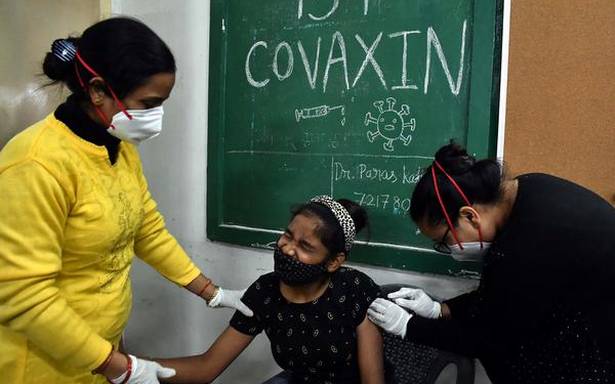November 3 announcement from WHO allows use of vaccine only in ‘all age groups 18 and above’
On December 25, 2021, Prime Minister Narendra Modi announced that adolescents aged 15-17 years will be eligible for a COVID-19 vaccine beginning January 3.. Two days after the announcement, the Health Ministry issued guidelines for the vaccination programme for teenagers .
While clearly stating that teenagers aged 15 or older (all those whose birth year is 2007 or before) will be able to register on Co-WIN, the Ministry emphasised that only Covaxin will be administered to this age group. Covaxin was granted an emergency use approval for use in children 12 years and above on the same day the Prime Minister made the announcement.
Also Read: Govt’s decision on COVID-19 vaccination for children ‘unscientific’, says senior epidemiologist
However, the Ministry guidelines wrongly state that Covaxin is the “only vaccine with WHO’s emergency use listing (EUL) for the age-group 15-18”.
On November 3, 2021, the WHO issued an emergency use listing (EUL) for Covaxin for use in adults. The press release of November 3 says that WHO’s Strategic Advisory Group of Experts on Immunization (SAGE), which formulates vaccine specific policies and recommendations for vaccines’ use in populations, had on October 5 reviewed Covaxin and “recommended” the vaccine in “all age groups 18 and above”.
On November 3, WHO also took to Twitter to broadcast its decision to include Covaxin in the emergency use listing of COVID-19 vaccines. In a series of tweets, the WHO reiterated that the SAGE had reviewed and recommended the “use of Covaxin in two doses, with a dose interval of four weeks, in all age groups 18 and above”.
A statement issued on November 24 last year once again stresses that Covaxin has not received emergency use listing for use in children. It states that though Covaxin developed by Bharat Biotech has been approved in India for children 12-17 years, it has “not yet received WHO EUL for this age indication”.
Also Read: Traditional vaccines just as effective, says U.S. scientist
For Covaxin to be approved for children above 12 years to be granted an emergency use listing, Bharat Biotech has to submit manufacturing quality data, clinical and non-clinical data of the vaccine in children above 12 years and labelling details.
It is not clear how the Health Ministry had incorrectly said Covaxin has an EUL for the 15-18 years age group.
Bharat Biotech began the process of seeking WHO’s EUL for Covaxin for use in adults when it submitted its application on July 9. Bharat Biotech was repeatedly asked by the WHO to clarify and submit additional data. The vaccine was approved for EUL four months after the application was submitted. Speaking at the Times Now Summit 2021, Bharat Biotech Chairman and MD Dr. Krishna Ella had said “negative publicity” — particularly by the media — led to delay in getting the EUL.
Editorial | Securing the young: On COVID-19 vaccines for children and booster shots
But Dr. Bruce Aylward, Senior Advisor to WHO Director General Tedros Adhanom Ghebreyesus, was categorical on the reasons for the delay.
“Let’s be very clear, the timeline for Emergency Use Listing a vaccine depends 99% on manufacturers — the speed, the completeness with which they can get data to the independent groups that assesses for WHO. We just want to be very, very clear on that point,” he said.
The WHO also made it clear saying: “When the information provided addresses all questions raised, WHO and the Technical Advisory Group will complete the assessment and come to a final recommendation whether to grant Emergency Use Listing to the vaccine.”
The WHO’s emergency use listing is a prerequisite for vaccine supply through the COVAX Facility; the EUL also allows countries to expedite their own regulatory approval to import and administer COVID-19 vaccines.
The WHO’s emergency use listing procedure is a risk-based procedure for assessing and listing unlicensed vaccines and drugs to expedite the availability of these products to people affected by a public health emergency.
Source: Read Full Article

